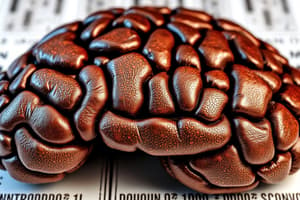Podcast
Questions and Answers
Which of the following scenarios best illustrates the process of encoding in memory?
Which of the following scenarios best illustrates the process of encoding in memory?
- Repeating a phone number silently until you can write it down.
- Associating a person's name with a unique characteristic to remember it. (correct)
- Recognizing a familiar song on the radio.
- Remembering the details of your first day of school.
According to the presented information, what is a key distinction between sensory memory and short-term memory?
According to the presented information, what is a key distinction between sensory memory and short-term memory?
- Sensory memory involves auditory information, while short-term memory involves visual information.
- Sensory memory has a longer duration than short-term memory.
- Sensory memory holds raw information, while short-term memory involves actively processed information. (correct)
- Sensory memory has a limited capacity, while short-term memory has an unlimited capacity.
What strategy would be most effective for transferring information from short-term memory to long-term memory?
What strategy would be most effective for transferring information from short-term memory to long-term memory?
- Focusing on the sensory details of the information.
- Creating meaningful associations between the new information and existing knowledge. (correct)
- Repeating the information silently without any additional processing.
- Ignoring any distractions while trying to memorize the information.
Rajan Mahadevan's memory feats suggest that:
Rajan Mahadevan's memory feats suggest that:
According to the information presented at the beginning, what are the three key processes involved in memory?
According to the information presented at the beginning, what are the three key processes involved in memory?
How does the presented information describe the accuracy of memories?
How does the presented information describe the accuracy of memories?
In the context of memory, what does 'encoding' specifically refer to?
In the context of memory, what does 'encoding' specifically refer to?
What is the significance of association in the context of memory storage?
What is the significance of association in the context of memory storage?
Why is taking notes in class considered helpful for memory?
Why is taking notes in class considered helpful for memory?
What is the main implication of the research on implanted false memories?
What is the main implication of the research on implanted false memories?
According to the material, what best describes 'chunking' as a memory strategy?
According to the material, what best describes 'chunking' as a memory strategy?
According to the notes, what can brain damage impact in regards to memory systems?
According to the notes, what can brain damage impact in regards to memory systems?
What is the key difference between semantic and episodic memory, as types of declarative memory?
What is the key difference between semantic and episodic memory, as types of declarative memory?
What is a defining characteristic of procedural (implicit) memory?
What is a defining characteristic of procedural (implicit) memory?
How do emotional hormones like adrenaline and cortisol affect memory?
How do emotional hormones like adrenaline and cortisol affect memory?
When learning new information, which encoding strategy is generally more effective?
When learning new information, which encoding strategy is generally more effective?
Elaborative rehearsal is effective because it:
Elaborative rehearsal is effective because it:
According to Freud's theory, what happens to repressed memories?
According to Freud's theory, what happens to repressed memories?
The "primacy effect" refers to:
The "primacy effect" refers to:
Automatic encoding is MOST likely to occur for which type of information?
Automatic encoding is MOST likely to occur for which type of information?
If someone is trying to remember a phone number but gets distracted by a question, what memory process is most directly affected?
If someone is trying to remember a phone number but gets distracted by a question, what memory process is most directly affected?
What is the primary limitation of short-term memory?
What is the primary limitation of short-term memory?
What is a "flashbulb memory?"
What is a "flashbulb memory?"
Flashcards
Encoding
Encoding
The process of creating mental representations of information so it can be stored in memory.
Storage
Storage
The process of placing encoded information into relatively permanent mental repositories for future use.
Retrieval
Retrieval
The process of bringing or recalling information that has been placed into short-term or long-term memory.
Sensory Memory
Sensory Memory
Signup and view all the flashcards
Short-Term Memory/Working Memory
Short-Term Memory/Working Memory
Signup and view all the flashcards
Long-Term Memory
Long-Term Memory
Signup and view all the flashcards
Auditory Memory
Auditory Memory
Signup and view all the flashcards
Chunking
Chunking
Signup and view all the flashcards
Effortful encoding
Effortful encoding
Signup and view all the flashcards
Declarative memory
Declarative memory
Signup and view all the flashcards
Episodic memory
Episodic memory
Signup and view all the flashcards
Semantic memory
Semantic memory
Signup and view all the flashcards
Procedural memory
Procedural memory
Signup and view all the flashcards
Flashbulb memory
Flashbulb memory
Signup and view all the flashcards
Study Notes
- Memory is the ability to retrieve information after a period of time through encoding, storage, and retrieval.
- Memories are representations of the world, not exact copies, and their accuracy can vary and be susceptible to error and distortion.
Incredible Memory
- Rajan Mahadevan memorized the first 31,811 digits of Pi, who made no mistakes until reaching the 31,812th digit.
- This feat lasted 3 hours and 44 minutes which led Rajan Mahadevan to cry when his name was entered into the Guinness World Records.
- Rajan can repeat a sequence of 60 digits after hearing them once.
- Most people can only remember 7-10 random digits.
- Rajan's face recognition ability is below average and he frequently forgets where he puts his keys, despite his number memorization skills.
Encoding
- Encoding is the process to create memories
- Rajan developed a method to create memories associated with numbers
- Encoding involves creating mental representations of information so it can be stored in our memory.
- For example, Rajan associated the number 111 with Admiral Nelson, one eye, arm and leg.
Storage
- Storage involves placing encoded information into relatively permanent mental repositories for future use.
- Associations are helpful for both encoding and information storage.
- New information is easier to recall or retrieve when associating with old or familiar knowledge.
Retrieval
- Retrieval involves brining back to mind or recalling information that has been placed into short-term or long-term memory.
- Fewer than half a dozen people in the world can approach Rajan's ability to encode, store, and retrieve thousands of digits.
- A person's ability to recall information can vary.
Types of Memory
- A popular model divides memory recall into separate processes: sensory, short-term, and long-term memory.
Sensory Memory
- Sensory memory is the initial process that holds raw information from the environment for a fraction of a second to a few seconds.
- Without attention, sensory memory will fade away with leaving a trace.
- For example, the sound of a guitar is held in sensory memory for a second or two after it reaches the listeners ears.
- Focusing on the guitarist transfers auditory information from sensory memory to short-term memory.
Short-Term Memory
- Short-Term Memory or Working Memory holds a limited amount of information for a brief period.
- Short term memory can hold an average of about seven items for between 2 to 30 seconds.
- Once information is transferred to short term memory (also known as working memory), it remains there for a maximum of 30 seconds.
- Engaging with the information more actively allows it to stay in short term memory for a longer period through humming if it a melody.
- Information in the short-term memory will be lost after a short time without transfer to long-term memory.
Long-Term Memory
- Engaging in a mental activity increases the likelihood of transferring music from short-term to long-term memory.
- Long-term memory stores an almost infinite amount of information for a long time.
- Hundreds of songs, terms, faces, and conversations are stored in long term memory
- Everything learned cannot always be retrieved from personal experiences.
Memory Processes
- Information moves from Sensory -> Short-term ->Long-term.
- Paying attention transfers to the next memory stage.
- Information in long-term memory remains there relatively permanently.
- Insufficient notes in class leads to inadequate encoding, resulting in poor retrieval during exams.
- Encoding and retrieval succeed by associating new information with existing information.
Sensory Memory Types
- Visual memory is a type of sensory memory that automatically holds visual information for a quarter of a second and then disappears as attention shifts elsewhere.
- During blinks the eyes are completely blind thanks to visual memory which makes it seem like the world does not disappear during blinks.
- Auditory memory holds sounds for a short period of time and replays back
- Auditory memory also holds onto speech sounds in to understand that certain sound sequences form words for 1-2 seconds
Studying That Suits You
Use AI to generate personalized quizzes and flashcards to suit your learning preferences.




